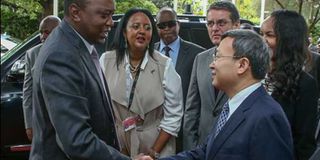Unfair trade practices from rich countries impeding Africa’s growth, says Uhuru

President Uhuru Kenyatta with WTO Director-General Roberto Carvalho de Azevêdo during the "high-level" segment of the fourth China Round Table. The President said rich countries' continuing refusal to remove subsidies negates the objective of fair trade. PHOTO | PSCU
What you need to know:
- The China Round Table is a meeting where China and 161 other WTO members meet to discuss trade policies aimed at strengthening the rules-based multilateral trading system.
- The round table meeting was a first in Africa but it comes ahead of the 10th ministerial conference of the WTO in Nairobi, dubbed MC10.
- President Kenyatta argued that the WTO in itself has supported African countries in a time when the rich imposed several protectionist policies.
President Uhuru Kenyatta has said that Africa’s development is being hampered by unfair trade practices by rich countries, which affects the continent’s competitiveness in international trade.
President Kenyatta says the continued refusal by rich countries to remove subsidies negates the objective to use trade as an instrument for growth and development.
He said this in a speech Monday during a meeting of China and World Trade Organisation members in Nairobi.
“Trade rules in agriculture must be made fairer. Trade distorting domestic support is damaging African agriculture and industry,” he told the meeting, formally known as the Fourth China Round Table, at Intercontinental Hotel, on Monday.
“If we are to industrialise, tariff escalation and peak tariffs should be eliminated. African economies producing competitively should not be halted with defensive trade remedies. Standards should not be the next frontier of protectionism,” he added.
The China Round Table is a meeting where China and 161 other WTO members meet to discuss trade policies aimed at strengthening the rules-based multilateral trading system.
The WTO is an intergovernmental organisation meant to regulate international trade rules and was created in 1995.
DOMESTIC REFORMS
The round table meeting focused on “domestic reforms for competitiveness and deeper trade integration in the global economy, with the focus on Africa.”
On Monday, China (which joined the WTO in 2001) renewed its memorandum of understanding with the WTO that specifies China’s trade links with the least developed countries as well as those that recently joined the organisation.
The round table meeting was a first in Africa but it comes ahead of the 10th ministerial conference of the WTO in Nairobi, dubbed MC10.
It came ten days after china announced $60 billion in development aid during the Forum on China-Africa Co-operation (FOCAC) in South Africa.
But ahead of the MC10 meeting which starts on Tuesday December 15, 2015, also a first in Africa, critics charge that the WTO’s 20 years of existence have been used by rich countries to skew international trading rules.
TALKS STALLED FOR 15 YEARS
For example, talks on how to remove agricultural subsidies, use of sensitive technology and removal of trade barriers have stalled for the past 15 years as the rich and poor countries pull in different directions.
President Kenyatta argued that the WTO in itself has supported African countries in a time when the rich imposed several protectionist policies.
He argued that, although Africa is responsible for its own development path, these subsidies and stringent standards for African produce were being used to curtail African growth.
“But every system requires renewal and regeneration to make it stronger. This is why we have gathered in Nairobi to reflect and come up with ways to strengthen the multilateral trading system.
“National, regional and multilateral policy choices that we make will matter. The choices and positions we take will have consequences,” the President stated.
“Even as Africa has registered robust growth, manufacturing is failing and the industrial process is weak and in reversal.
“We urgently need to embark on diversifying our economies, re-establishing our manufacturing base and, integrating it into value chains,” the President said.
During the last ministerial conference in Indonesia in 2013, WTO delegates reached an agreement on trade facilitation that would essentially provide for faster movement of goods across borders.
However, only 27 countries out of 162 have ratified the agreement.
It requires two thirds of the entire WTO membership for the agreement to come into force.
During the round table event, Foreign Affairs CS Amina Mohamed, who will chair the MC10, argued that each country’s domestic trade reforms will contribute to the strengthening of the WTO.





